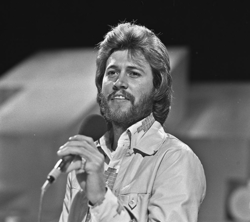Fame

A few months after Children of the World, the trio worked together again on Andy Gibb's Flowing Rivers album, recorded in October 1976. Barry and Joe Walsh also performed on two songs from the album, "I Just Want to Be Your Everything" and "(Love Is) Thicker Than Water" (both US No. 1), although the album was mainly produced by Galuten and Richardson. The album was released in late 1977. Gibb-Galuten-Richardson later crafted songs for a diverse roster of talent, including producing four other US Top 10 singles for Andy Gibb such as "Shadow Dancing", "An Everlasting Love" and "(Our Love) Don't Throw it All Away". Samantha Sang's 1977 hit "Emotion", which the trio produced, reached No. 3 on the Billboard Hot 100. Another song the trio produced was "Save Me, Save Me" by Network (the first song credited to Gibb and Galuten). The trio also produced singles by Frankie Valli ("Grease") and Teri DeSario ("Ain't Nothing Gonna Keep Me From You"). [2]
In 1979, the Bee Gees (including Barry), Galuten and Richardson won the Grammys for Best Producer of the Year, Non-Classical. [3]
The trio's last project on an Andy Gibb full album was After Dark which contains his last US Top 5 single "Desire", although Andy Gibb's Greatest Hits (released September 1980) album contains only three new songs.

In 1980, the trio produced Barbra Streisand's Guilty which became Streisand's best-selling album to date internationally when it was released, with sales of 12 million. [4] The album features three US Top 10 singles, including the No. 1 hit "Woman In Love," "Guilty" and "What Kind of Fool" (the latter two being duets between Streisand and Gibb).
Their next production was in 1982 when Clive Davis, the president of Arista Records asked Barry Gibb to write songs for Dionne Warwick who recorded for Arista. Heartbreaker was released in October 1982; the title track reached No. 10 in the US and No. 2 in the UK, while the album reached No. 25 on the Billboard 200. [5] [6]
Also in 1982, Barry met Kenny Rogers and Rogers asked Barry about writing some songs for him. By August, Barry started recording demos for Rogers by doing the demo of "Eyes That See in the Dark". The release of Rogers' Eyes That See in the Dark album reached No. 1 on US Country charts. [6] [7] The lead single on Rogers' album was a duet between himself and fellow country singer Dolly Parton entitled "Islands in the Stream" that became US No. 1 hit in the Billboard Hot 100, Country Charts, Adult Contemporary Charts and on Canadian Country Charts, and was also certified Platinum by the Recording Industry Association of America for selling over two million physical copies in the US. [8] In 1984, when Barry Gibb was recording his first solo album, Galuten was not available at the sessions as he traveled to California the previous year after he disagreed with Barry. As a result, the album Now Voyager was credited only to Barry and Richardson. [9]
In 1985, Barry had teamed again with Galuten and Richardson to produce an album for another American recording artist Diana Ross entitled Eaten Alive . But it was the trio's last album production. [10] Eaten Alive was released on the RCA label in the US where it was deemed a commercial failure, selling fewer than 300,000 US copies. [11] The title track was produced by the trio with Michael Jackson, who also co-wrote the track. [12]